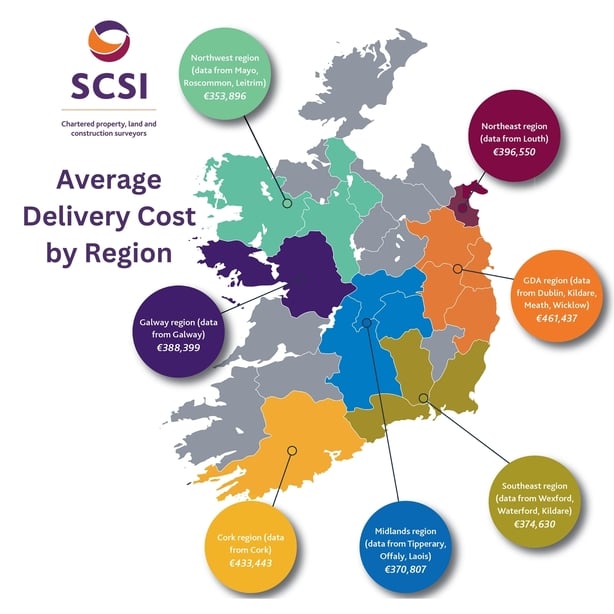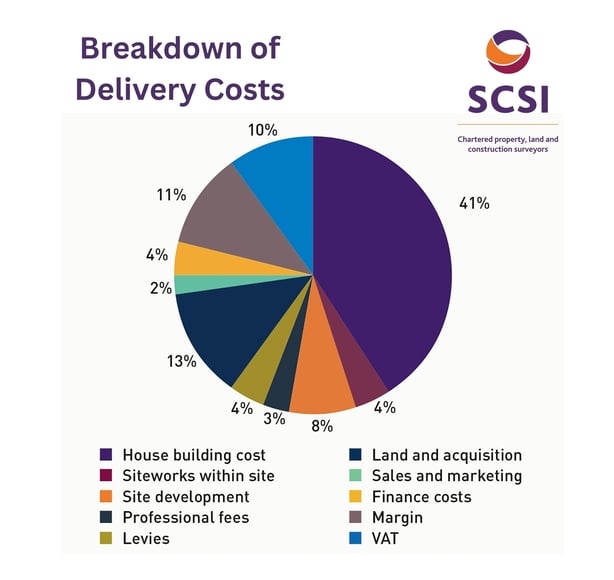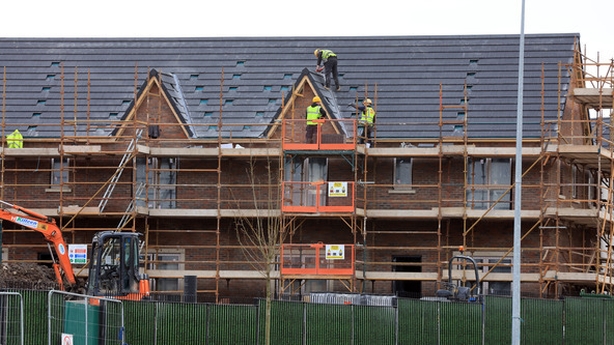Buyers would need to have a combined minimum salary of €127,000 to buy an average new three-bed house in the greater Dublin area, while that figure for the northwest is €85,000, according to a new report from the Society of Chartered Surveyors Ireland (SCSI).
The report, which highlights the affordability challenges facing first-time buyers, shows that the greater Dublin area, Galway and Cork are the most expensive regions for buying a new home.
However, the SCSI said Government supports aimed at addressing affordability are making a noticeable impact.
"The SCSI believes the Department of Housing, Local Government and Heritage should review the First Homes Scheme purchase price ceilings to ensure the shared equity scheme is accessible to average market values for each county," said Enda McGuane, President of the SCSI.
"The price ceilings should then be adjusted in line with construction inflation to avoid the ceilings becoming inaccessible in the future," he added.
We need your consent to load this rte-player contentWe use rte-player to manage extra content that can set cookies on your device and collect data about your activity. Please review their details and accept them to load the content.Manage Preferences
The report also shows that the average cost of delivering a new three-bedroom semi-detached home in Ireland is €397,000.
These costs not only include the building of the house, but also things like site works, levies and land and acquisition costs.
Read the report in full here.

Data from the SCSI shows that the cost is the lowest in the northwest of the country at €354,000, and highest in the greater Dublin area at €461,000.
Costs in the greater Dublin area have increased by 24% or €90,000 since the last report was carried out three years ago, and by 39% since the first report in 2016.
According to the SCSI, the rise in costs in the region since 2020 has been driven by so-called 'hard costs', such as bricks and mortar, which are up 27% or €49,000 on average.
"The main hard cost drivers have been energy, fuel, and shipping costs," said Chartered Quantity Surveyor Micheál Mahon, one of the report's authors.
"The cost of various building materials, particularly concrete, insulation, electrical and plumbing products, steel reinforcement, and timber products, also increased dramatically," he added.

Mr Mahon said 'hard costs' now make up 53% of the total costs of overall delivery nationally, while 'soft costs' make up the remaining 47%.
The report states that 'soft costs' such as land, development levies, fees and vat increased by 21% or €41,000.
"The primary soft cost drivers have been land costs, financing due to higher interest rates, levies and an uplift in the cost of professional fees," Mr Mahon said.
"On a national basis, land and acquisition costs per unit equate to 13% of overall delivery costs on average," he added.

The report recommends that more is needed to be done to support "modern methods" of construction.
It also wants to see a pause in future increases to connection charges and levies and to ensure the planning process is fit for purpose.
Sinn Féin's Finance Spokesperson Pearse Doherty said housing is becoming more and more unaffordable for people.
Speaking in the Dáil, he said the SCSI report states "very clearly" that a joint income of €127,000 is needed to buy a home in Dublin.
In a question to Minister for Housing Darragh O'Brien, Mr Doherty said: "Is it any wonder that generations of people are now losing hope and are moving abroad to build a life?"
Mr O’Brien responded by saying the First Home Scheme and the Help to Buy Scheme are opposed by Sinn Féin.
He said young people need to know that Sinn Féin is "not offering alternatives on housing" and the party is against all the grants available to first-time buyers.
Mr O'Brien said more than 30,000 homes will be delivered this year and between 40% and 50% are supported by the State.
Households 'priced out of the market'
People Before Profit TD Richard Boyd-Barrett said that around 80% of Irish households earn less than €120,000.
Speaking on RTÉ's Drivetime, he said that households are being "priced out of the [housing] market, because the market is completely incapable of delivering housing that is affordable".
"So we need massive State intervention in order to deal with a market failure, which has left the majority of people who go out there and work hard in a situation where they could never possibly afford these prices.
"And then you look at the delivery of affordable housing by the Government and it is absolutely pitiful."
Meanwhile, Mr McGuane called on the Government to update the 'Housing for All' targets as Ireland's population increases.
"'Housing for All' targets were based on the 2016 Census, and the population has grown by 8%. Therefore, targets need an immediate revision based on the most up-to-date census figures," he added.
Mr McGuane also said they are increasingly seeing the viability of developments that receive planning permission being impacted by design or density requirement conditions.
"We believe financial viability should be required within the planning permission process, especially concerning planning conditions imposed as parts of grants," he said.
"The SCSI welcomes proposals to increase densities within new housing estates in the draft Sustainable and Compact Settlements Guidelines to help make suburban sites more viable by reducing the requirement for expensive apartment buildings in such estates," he added.







